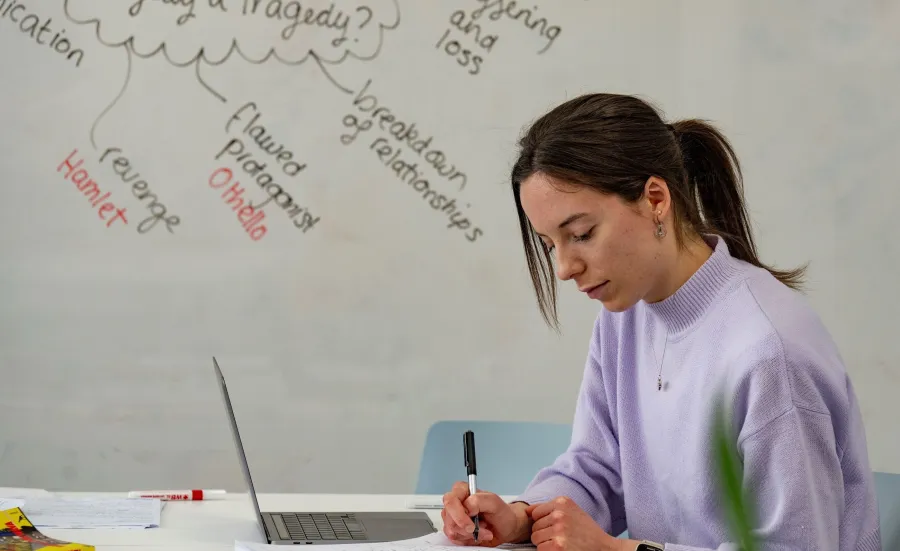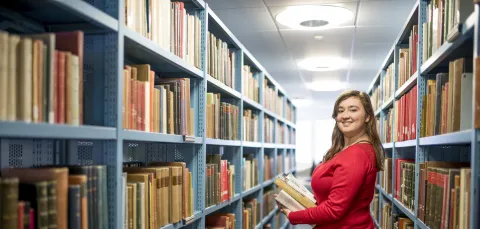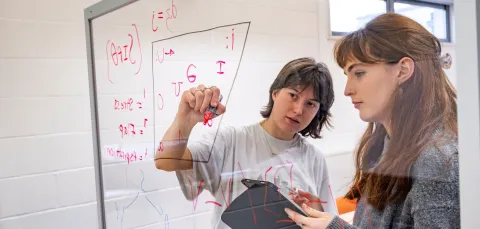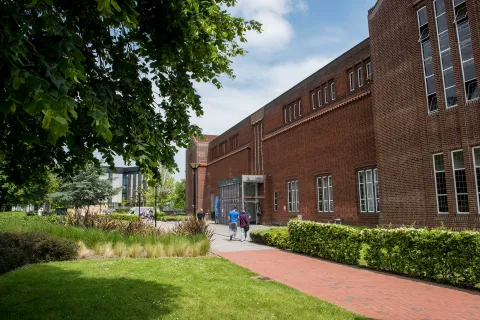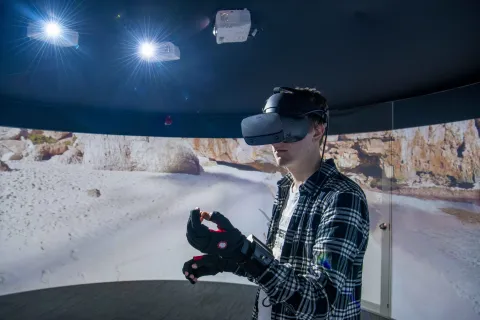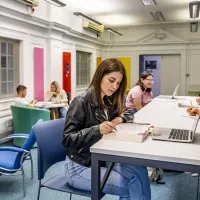About this course
Develop your French, German or Spanish and critical thinking skills as you explore how languages are created, learned and shaped.
You can study your chosen language on this 4-year degree with our expert language tutors, working towards native-like proficiency and cultural fluency in both spoken and written language.
You’ll combine this with linguistics, studying a range of different disciplines including sociolinguistics, psycholinguistics, phonetics, morphology and syntax, discourse analysis and language disorders.
This programme gives you the chance to study cultural topics linked to your chosen language, including migration and displacement, race and ethnicity, gender and sexuality, and film and cultural memory.
You can take careers-focused modules to help open career paths. You’ll examine topics such as translation and interpretation.
You’ll spend a year of your degree abroad on a workplace, teaching or university placement. We have opportunities all over the world including Europe, South America and North America. You can develop your language skills in a new environment while learning about the French, German or Spanish-speaking world's culture, history and thought.
Language study paths
These are the languages you can choose from:
- BA Modern Languages (French) and Linguistics
- BA Modern Languages (German) and Linguistics
- BA Modern Languages (Spanish) and Linguistics
We regularly review our courses to ensure and improve quality. This course may be revised as a result of this. Any revision will be balanced against the requirement that the student should receive the educational service expected. Find out why, when, and how we might make changes.
Our courses are regulated in England by the Office for Students (OfS).
Learn more about these subject areas

In my first, second and third years, I volunteered for the Southampton Hub Schools Plus scheme. I enjoyed working with pupils and giving something back to the local community. It was very rewarding to see the students grow in confidence every week.
Course location
This course is based at Avenue.
Awarding body
This qualification is awarded by the University of Southampton.
Download the Course Description Document
The Course Description Document details your course overview, your course structure and how your course is taught and assessed.
Entry requirements
For Academic year 202627
A-levels
ABB
A-levels additional information
Offers typically exclude General Studies and Critical Thinking.
A-levels with Extended Project Qualification
If you are taking an EPQ in addition to 3 A levels, you will receive the following offer in addition to the standard A level offer: BBB and grade A in the EPQ.
A-levels contextual offer
We are committed to ensuring that all applicants with the potential to succeed, regardless of their background, are encouraged to apply to study with us. The additional information gained through contextual data allows us to recognise an applicant's potential to succeed in the context of their background and experience. Applicants who are highlighted in this way will be made an offer which is: BBC from 3 A levels.
International Baccalaureate Diploma
Pass, with 32 points overall with 16 points at Higher Level
International Baccalaureate contextual offer
We are committed to ensuring that all learners with the potential to succeed, regardless of their background, are encouraged to apply to study with us. The additional information gained through contextual data allows us to recognise a learner’s potential to succeed in the context of their background and experience. Applicants who are highlighted in this way will be made an offer which is lower than the typical offer for that programme.
International Baccalaureate Career Programme (IBCP) statement
Offers will be made on the individual Diploma Course subject(s) and the career-related study qualification. The CP core will not form part of the offer. Where there is a subject pre-requisite(s), applicants will be required to study the subject(s) at Higher Level in the Diploma course subject and/or take a specified unit in the career-related study qualification. Applicants may also be asked to achieve a specific grade in those elements. Please see the University of Southampton International Baccalaureate Career-Related Programme (IBCP) Statement for further information. Applicants are advised to contact their Faculty Admissions Office for more information.
BTEC
RQF BTEC
Distinction, Distinction, Merit in the BTEC National Extended Diploma, or Distinction, Distinction in the BTEC National Diploma plus B in an A level, or Distinction in the BTEC National Extended Certificate plus AB from 2 A levels.
We are committed to ensuring that all learners with the potential to succeed, regardless of their background, are encouraged to apply to study with us. The additional information gained through contextual data allows us to recognise a learner’s potential to succeed in the context of their background and experience. Applicants who are highlighted in this way will be made an offer which is lower than the typical offer for that programme.
Additional information
Offers typically exclude General Studies and Critical Thinking.
QCF BTEC
Distinction, Distinction, Merit in the BTEC Extended Diploma, or Distinction, Distinction in the BTEC Diploma plus B in an A level, or Distinction in the BTEC Subsidiary Diploma plus AB from 2 A levels.
BTEC contextual
We are committed to ensuring that all learners with the potential to succeed, regardless of their background, are encouraged to apply to study with us. The additional information gained through contextual data allows us to recognise a learner’s potential to succeed in the context of their background and experience. Applicants who are highlighted in this way will be made an offer which is lower than the typical offer for that programme.
Access to HE Diploma
60 credits with a minimum of 45 credits at Level 3, of which 30 must be at Distinction and 15 credits at Merit.
Access Offer Contextual
We are committed to ensuring that all learners with the potential to succeed, regardless of their background, are encouraged to apply to study with us. The additional information gained through contextual data allows us to recognise a learner’s potential to succeed in the context of their background and experience. Applicants who are highlighted in this way will be made an offer which is lower than the typical offer for that programme.
Irish Leaving Certificate
Irish Leaving Certificate (first awarded 2017)
H1 H2 H2 H2 H3 H3
Irish Offer Contextual
We are committed to ensuring that all learners with the potential to succeed, regardless of their background, are encouraged to apply to study with us. The additional information gained through contextual data allows us to recognise a learner’s potential to succeed in the context of their background and experience. Applicants who are highlighted in this way will be made an offer which is lower than the typical offer for that programme.
Scottish Qualification
Offers will be based on exams being taken at the end of S6. Subjects taken and qualifications achieved in S5 will be reviewed. Careful consideration will be given to an individual’s academic achievement, taking in to account the context and circumstances of their pre-university education.
Please see the University of Southampton’s Curriculum for Excellence Scotland Statement (PDF) for further information. Applicants are advised to contact their Faculty Admissions Office for more information.
Cambridge Pre-U
D3 M2 M2 in three principal subjects
Cambridge Pre-U additional information
Offers typically exclude General Studies and Critical Thinking.
Cambridge Pre-U Offer Contextual
We are committed to ensuring that all learners with the potential to succeed, regardless of their background, are encouraged to apply to study with us. The additional information gained through contextual data allows us to recognise a learner’s potential to succeed in the context of their background and experience. Applicants who are highlighted in this way will be made an offer which is lower than the typical offer for that programme.
Welsh Baccalaureate
ABB from 3 A levels or AB from two A levels and B from the Advanced Skills Baccalaureate Wales.
Welsh Baccalaureate additional information
Offers typically exclude General Studies and Critical Thinking.
Welsh Baccalaureate contextual offer
We are committed to ensuring that all learners with the potential to succeed, regardless of their background, are encouraged to apply to study with us. The additional information gained through contextual data allows us to recognise a learner’s potential to succeed in the context of their background and experience. Applicants who are highlighted in this way will be made an offer which is lower than the typical offer for that programme.
T-Level
The following T levels are accepted: Media, Broadcast and Production; Legal Services; Marketing
Other requirements
GCSE requirements
Applicants must hold GCSE English language (or GCSE English) (minimum grade 4/C) and mathematics (minimum grade 4/C)
Find the equivalent international qualifications for our entry requirements.
English language requirements
If English is not your first language, you must show that you can use English to the level we require. Visit our English language pages to find out which qualifications we accept and how you can meet our requirements.
If you are taking the International English Language Testing System (IELTS), you must get at least the following scores:
IELTS score requirements
- overall score
- 6.5
- reading
- 6.0
- writing
- 6.0
- speaking
- 6.0
- listening
- 6.0
If you do not meet the English language requirements through a test or qualification, you may be able to meet them by completing one of our pre-sessional English programmes before your course starts.
You might meet our criteria in other ways if you do not have the qualifications we need. Find out more about:
- skills you might have gained through work or other life experiences (otherwise known as recognition of prior learning)
Find out more about our Admissions Policy.
Mature applicants
We welcome applications from learners of all ages. Students who are aged 21 and over at the start of their undergraduate course are defined as mature by the University of Southampton. We take a holistic assessment of the application looking for academic ability and commitment to study. Typical entry requirements, which may vary from discipline to discipline, includes for example, evidence of recent formal academic qualifications or professional qualifications, relevant work experience or volunteering. You may also be invited to attend an interview with an Admissions Tutor. For some degree programmes, there may also be a Professional, Statutory and Regulatory Body (PSRB) requirement. We accept many different academic qualifications. For more information, please contact the Admissions Team.
Got a question?
Please contact our enquiries team if you're not sure that you have the right experience or qualifications to get onto this course.
Email: enquiries@southampton.ac.uk
Tel: +44(0)23 8059 5000
Course structure
You’ll spend around 25% of your time studying your chosen language, with the remaining 75% spent on modules in linguistics, cultural studies, other languages, or modules from outside the department.
Year 1 overview
We will work out which language level you are at based on your previous experience, giving you the best start to develop your skills. You’ll take a year-long double module in the language covering all the relevant areas of language study.
You’ll also take an introductory module on contemporary issues in either the French-, German- or Spanish-speaking worlds.
On the linguistics side, you’ll study modules that will introduce and give you an understanding of key topics in linguistics including language ideologies, and language structure.
You’ll also take a non-credit-bearing module in Academic Skills for Modern Languages and Linguistics students, covering topics such as academic writing and referencing, independent language learning, library resources, reading journal articles, and employability.
Year 2 overview
You can continue your studies in French, German or Spanish, increasing your level of fluency in all areas. You then get to choose at least 2 linguistics modules and at least 1 language and culture modules. You also have the option of taking modules from other disciplines, including our state-of-the-art Digital Humanities department.
The intermediate modules in linguistics cover topics such as syntax, multilingulism and the power and institutions in language.
You’ll study language-specific linguistics modules for your chosen language.
You can choose modules that equip you with different ways to study cultures and languages that will further build your understanding of language within culture
Year 3 overview
You'll carry out your third year abroad and get to know a foreign culture either as a student, a teaching assistant, or in a work placement.
You’ll work independently on tasks as you build knowledge of your chosen language, culture and society while completing a short portfolio of work. This will build towards completing your studies in French, German or Spanish.
We will support you during your period abroad, with frequent contact with course leaders and your Personal Academic Tutor.
Year 4 overview
You’ll develop your language and linguistics studies to an advanced level on your return from abroad. You can continue studying French, Spanish or German through to the final stages of your course. You then choose at least 3 linguistics modules and at least 2 language modules.
The advanced modules in the linguistics curriculum will help you further understand the impact that language has around the world and through media, and the issues facing people with language and speech disorders.
You’ll further understand languages and culture through advanced modules that cover a range of topics from migration to film and literature.
You also have the option of carrying out independent research for a dissertation using the intellectual skills you've gained throughout your degree. Students are guided by a subject expert through reviewing literature, collecting and analysing their own data collection, and writing up their findings.
Want more detail? See all the modules in the course.
Modules
The modules outlined provide examples of what you can expect to learn on this degree course based on recent academic teaching. As a research-led University, we undertake a continuous review of our course to ensure quality enhancement and to manage our resources. The precise modules available to you in future years may vary depending on staff availability and research interests, new topics of study, timetabling and student demand. Find out why, when and how we might make changes.
Choose from the study paths below to display modules on this page.
Your modules
Modules will display here
For entry in academic year 2026 to 2027
Year 1 modules
You must study the following modules in year 1:
Academic Skills for Modern languages and Linguistics students
This module is designed to ease the transition from A-level to the first year of a single or combined honours degree programme by setting out clearly what we expect of you at undergraduate level and equipping you with the resources to be able to operate a...
English on the Move
English has always been on the move. As a literary language, it has not only travelled from and back to England; lines of influence between texts, authors, publishers, editors, book technologies, and readers traverse the globe in multiple directions, bet...
Introduction to French and Francophone Studies
This module is designed to provide you with a broad introduction to the culture, history and language of France and Francophone countries. By studying various types of primary and secondary sources, you will become familiar with a wide range of themes, e...
Introduction to German Studies
This module is designed to provide you with a broad introduction to the culture, history and language of Germany and other German-speaking countries. By studying various types of primary and secondary sources, you will become familiar with a wide range o...
Introduction to Spanish and Latin America Studies
This module is designed to provide you with a broad introduction to the culture, history and language of Spain, Latin America and the Spanish speaking World. By studying various types of primary and secondary sources, you will become familiar with a wide...
Poetic Language
How do we read poems, and what language can we use to describe our readings? This module will provide a detailed introduction to the particular qualities your ear, eye and brain will need to read poetry more effectively. You will study key features of poe...
You must also choose from the following modules in year 1:
Applications of Linguistics
This unit will introduce you to the main areas relevant to applied language studies.
Elements of Linguistics - Sound, Structure and Meaning
This module provides an introduction to linguistic approaches to sound, structure and meaning in the branches of linguistics known as phonetics and phonology, morphology, syntax, semantics and pragmatics.
Introduction to Ethnography: Food and Culture
Biological science tells us what items in our world are potentially edible, but culture decides what constitutes food. Culture informs us as to whether a specific item is appropriate, appetising, valued, desirable, prohibited, restricted, staple or medici...
Literary Transformations
Why have some stories gripped the imagination of writers, musicians, and artists across cultures and centuries? And what does the emergence and constant re-emergence of such stories tell us about ourselves and others, past and present? What do readers and...
The Invention of English Literature: Medieval to Early Modern
Where did the idea of ‘English Literature’ as we know it today come from? When and how did writers first start thinking of themselves as English authors? How did the mechanisms of book production and the material forms of books shape readers’ understandin...
Theory & Criticism
The module asks big questions. What do we do when we interpret literature and culture, and how can we analyse our practices of interpretation? Can anything be a text, and if so what do we understand by ‘literature’? How does literature shape our identity,...
Understanding Culture
This introductory course will give you an overview of some approaches to, and topics within, cultural and literary studies. You will spend time on close textual reading, as well as on broader cultural analysis. It aims to encourage you to experiment in c...
Understanding History and Society
This module will introduce you to studying questions of history, society and culture through the prism of Southampton in order that you can apply those approaches to the study of cities in the French, Spanish and German-speaking world.
World Dramas
In this module, you will learn how to approach dramatic texts in a way that takes into consideration their place in the world as a complex political, economic, and cultural network. We will focus on questions such as: • What is the difference between r...
Year 2 modules
You must study the following modules in year 2:
Preparation for your Third Year (Abroad)
This module was co-designed by LCL students and staff, and it is aimed at preparing participants for a period of cultural immersion (abroad) in their third year. Participants will be informed about the third-year assessment, Residence Abroad Portfolio...
The Worlding of English Literature
Since the mid-nineteenth century, new modes of transport and communication, commerce and violence, have remade the world. As empires expanded and contracted, and as the relationships between states and individuals were repeatedly reconfigured and tested, ...
You must also choose from the following modules in year 2:
Culture, Power and Resistance in the Portuguese-Speaking World
This course is designed to expand and deepen your knowledge of the cultures of the Portuguese-speaking world, bringing together written texts, visual and conceptual art, political materials, and cinema from twentieth-century Portugal, Brazil, and Portugu...
Eve and the Angels: Love, War, and the End of Epic in Milton's Paradise Lost
John Milton was a man so famous in his own time that French and Italian tourists tracked down his childhood home to see the chamber in which he had been born. He was even more famous after his death; indeed, his teeth, hair, fingers, and one of leg bones ...
Gender, Race and Nation in Modern Latin America
The course examines major turning points in Spanish and Portuguese America from the middle nineteenth century to the present, with a focus on how these upheavals affected and reflected the politics of class, gender and race.
Aesthetics and the Philosophy of Art
You might watch a stunning film, hear a delightful song, enjoy a beautiful sunset, read a dreadful poem, attend an elegant dance, or see a garish building. Experiences like this can stimulate thoughts and feelings of great depth, and provide pleasure or d...
African Freedoms and The Novel
In Africa, the ideal of freedom has the capacity to evoke multiple layers of struggle and aspiration: from state decolonisation and the end of official racial segregation, to gendered, national, economic and spiritual freedoms. Historically, the novel has...
Brief Encounters: Writing Short Stories
Many writers begin with the short story. Through writing short stories they are able to experiment, learn the fundamentals of narrative composition, and have the satisfaction of completing something to a high standard in a relatively short period of time....
Corpus Linguistics: Working with large-scale text data
In this module, we introduce corpus linguistics as an approach to and method for analysing large-scale text data. We will develop an understanding of building and curating datasets, annotating data, and using quantitative and statistical measures for text...
Decolonising Modernity
Literary history is often told in epochs. In particular, it can be useful to understand the world in relation to some or other idea of “modernity”: for example, English literary studies is often organised through conceptions of the early modern, the mode...
Desire and Decay: Literature of the Long Eighteenth and Nineteenth centuries
From the aftermath of the English Civil War in the seventeenth century to the cultural legacies of the nineteenth century, the literature of the long eighteenth and nineteenth centuries is marked by intense negotiations between desire and decay. The drive...
Discourse Analysis
This module highlights and analyses the link between language structure and its situation of occurrence.
Ethnography of Latin America
This module uses ethnographic approaches to understand the diversity of Latin America’s peoples and cultures. Emphasizing the emergence within Latin American anthropology of focuses on everyday life through topics such as kinship and family, ritual and re...
Exploring French Linguistics
This module explores various aspects of the French language from the perspective of modern linguistics: phonetics, phonology, morphology, syntax and lexis
Exploring Spanish Linguistics
The module introduces you to relevant issues and topics of contemporary Spanish linguistics and establishes the basis for future application of linguistic principles.
Film, Realism and Reality: representing the world, from revolution to the everyday
This module will introduce you to some of the principal realist and documentary movements, asking how the simple aim to ‘show things as they really are’ has resulted in a range of creative and wildly different cinematic forms. It will consider the issue a...
Ghosts on Screen
How do filmakers grapple with the difficulties of remembering events that many would rather forget? How are we haunted by the past? How do they seek to represent events that seem to defy representation? In tackling these questions, this module provides yo...
Global Hip Hop
Hip-hop is one of the most ubiquitous, lucrative and popular musics in the world. Although it emerged in the South Bronx (New York City) in the 1970s, the history of hip-hop goes far beyond the USA and includes myriad transnational exchanges. Hip-hop has ...
Globalisation: Culture, Language and The Nation State
This module will problematize the concept of globalisation and explore and develop an understanding of its meaning in economic, political and cultural terms. Furthermore, we will examine the ideological struggle between competing forces over the nature an...
Great Writers Steal: Creative Writing and Critical Thinking
Many writers have penned essays about fiction and memoir: E.M. Forster, Virginia Woolf, Henry James, Edith Wharton, Italo Calvino, Vladimir Nabokov, Milan Kundera, A.L. Kennedy, A.S. Byatt, to name just a famous few. Indeed, it seems essential at some p...
How the Arts Work: A Practical Introduction to Cultural Economics
How are the arts getting back to work again after Covid-19? This is a critically important question for everyone who cares about them, artists and audiences alike. If you’re a student considering a career in the arts you’ll want to know where fresh opport...
Immigration, Race and Ethnicity in France
What developments led to the headscarf and the so-called ‘burka ban’ in France? Why has ‘multiculturalism’ been a taboo subject? To what extent have anti-racism associations been a success in combating racism? This module offers you the opportunity to gai...
Language and Society in German-Speaking World
The main aim of this course is to explore and assess the contemporary importance of the German language, both within the so-called German-speaking countries and in the wider world. We shall identify key sociolinguistic issues as they relate to German-spea...
Language, Power and Institutions: how linguistic practices can shape our lives
This module will introduce you to the making of institutions through language. We will investigate the links between language, institutions, and power to understand, how institutions are not only shaping the language used by members and users of instituti...
Learning about Culture: Introduction to Ethnography
Multilingualism
This module will introduce you to the notion of ‘Multilingualism’, how this is understood and represented in different ways, and why it matters to you. You will explore how people become multilingual, and whether it makes a difference if multilinguals are...
Myths and Realities of Contemporary Spain
Taking the death of Franco and the Spanish democratic transition as a starting point, this module analyses the key social and political transformations that Spain has undergone in the last four decades.
Post-War French Thought and Culture
This module is designed to explore in detail the key areas of feminism, postcolonial theory, and cultural semiotics i.e. the analysis of cultural signs, whether in visual culture, such as advertising, political culture, or based in cultural practices. Th...
Psycholinguistics
This module examines different sub-topics in psycholinguistics which help to understand what the relationship between language and the human mind might be.
Puzzles about Art and Literature
Both individuals and society attach great importance and value to certain works of art, including poems, novels, films, plays, symphonies, and paintings. Most of us spend a considerable amount of our limited time and resources acquiring, creating, experie...
Queens, Devils and Players in Early Modern England
Early modern England is a period associated with Elizabeth I and the Tudor court, the plays of Shakespeare, blood and violence on the Jacobean stage, the discovery of new worlds, and the persecution of witches and heretics. The diversity and vitality of t...
Retail Therapy: A journey through the cultural history of shopping
We are all, in one way or another, participants in the consumer society. Whether we buy for necessity - life essentials such as food - or view it as an enjoyable leisure activity, our purchase of goods is part of a wider cultural movement pushing us to ‘s...
Romantics and Victorians
In 1831 the philosopher John Stuart Mill struggled to define the ‘Spirit’ of the nineteenth century. ‘It is’, he wrote, ‘an age of transition. Mankind have outgrown old institutions and old doctrines, and have not yet acquired new ones.’ If the nineteenth...
Songs of the Earth: Landscapes and Environments of Early Medieval England
How did people in early medieval England think, feel, and write about the world they inhabited? In what sorts of ways did literature and other forms of texts shape their engagements with landscapes, environments, and the beings – real and imagined – with ...
Sound and Voice
This module builds on the basic concepts of articulatory phonetics introduced in the first year, and introduces theory and methodology of acoustic science for the study of the production and perception of speech sounds.
Speech Acts
How do writers activate and amplify the sonic properties of language? Why do artists use vocal performance of text in video art? How can text ‘perform’ on the page (or onscreen), and what does it mean for language to be performative? What does writing for...
Sweatshops, Sex workers, and Asylum Seekers: World Literature and Visual Culture after Globalisation
What can the voices and narratives of sex workers and asylum seekers depicted in world literature and visual culture tell us about the conditions and pressures of life in the contemporary world? How might considerations of narrative technique, genre, and ...
Syntax: Studying Language Structure
This module will provide introduce you to the study of syntax within current linguistic theory.
Teaching English as a Foreign Language
This module will introduce you to key issues, concepts and methods in teaching English as a second/foreign language.
The EU and European Identity
The course seeks to provide an overview of the evolution of the European Union (EU) from its early stages to the present. In so doing, it examines the ideas and history of the EU, the institutions of the EU, examples of specific issue areas and the presen...
The Early Modern Body
In this module, students will explore a wealth of different texts and different discourses, from the literary to the scientific, on humanity and the human body in the early modern period. Starting with a glimpse of ancient and modern visions of the body, ...
The Life and Afterlife of the Vikings
Blood, violence, terror, raids, pirates, rape and pillage are just some of the words associated with the Vikings in both the medieval and modern imagination. Their fearsome reputation is underlined by nicknames such as ‘Blood Axe' and ‘Skull-splitter', bu...
Variation and Change in English
This module takes an empirical approach to questions such as: - Are there patterns of speech and language associated with males and females in varieties of English? - What is the role of teenagers in the propagation of change in English? - After a...
Vienna and Berlin: Society, Politics and Culture from 1890 to the Present
This module will introduce you to the social, political and cultural history of Vienna and Berlin in the 20th century, German using a wide range of sources which will include literature, film and architecture. Topics covered may include the following:...
Women, Writing and the Canon, 1770-1900
The period 1770-1900 was a pivotal time in the history of women’s writing in Britain. Writers like Jane Austen and Charlotte Brontë established their place in the literary canon, while their contemporaries struggled against conventions that suggested dome...
Year 3 modules
You must study the following module in year 3:
Year 4 modules
You must study the following module in year 4:
You must also choose from the following modules in year 4:
Exiles, Migrants and Citizens: Narrating and documenting displacement in contemporary Spain
Migration has been a recurrent theme that has characterized Spain’s social, political and cultural history since its emergence as a modern nation in 1492. By drawing on narrative inquiry, this module will focus on the most recent migration movements of th...
Aesthetics and the Philosophy of Art
You might watch a stunning film, hear a delightful song, enjoy a beautiful sunset, read a dreadful poem, attend an elegant dance, or see a garish building. Experiences like this can stimulate thoughts and feelings of great depth, and provide pleasure or d...
American Gothic
As the Puritan colonialist John Winthrop said at Holyrood Church in Southampton before embarking for Boston, American was to be ‘as a city upon a hill’, a beacon of progress and enlightenment for the world. But from the beginning, America has been shadowe...
An ambivalent asylum: the histories and memories of refugees in early twentieth-century France
Where does the idea of a stateless person come from? Why did France become one of the foremost nations for refugee reception? How were refugees fleeing from persecution in other parts of Europe treated in France? Why did France establish a system of ‘conc...
Arthurian Worlds
The figures of King Arthur, Guinevere, his knights and court have exercised a powerful hold over the minds of readers for many centuries. But have you ever wondered about where this legend came from, how it developed, and about the enduring nature of its ...
Audiovisual Translation
This module will introduce you to the different types of audiovisual translation and the various kinds of subtitles produced nowadays. You will learn about the interaction between text and image and the technical issues and constraints involved in creatin...
Creative Writing in Schools
Are you interested in helping young people study English? This module will introduce you to teaching creative writing in secondary schools by providing training in effective classroom management and guidance on designing lesson plans for studying fiction ...
Encounters with Bodies in Lusophone Cultural Narrative
Based on written texts, films and visual materials from and about Portugal, Brazil, Angola, Cape Verde, Guinea-Bissau and Mozambique, this course is intended to show you the cutting edge of cultural production and research from the Portuguese-speaking wo...
English Dissertation
Undertaking independent research into an aspect of literature or creative writing which particularly interests you is a cornerstone of your degree. A dissertation gives you the opportunity to study a subject in much greater depth than usual and, with gui...
Eve and the Angels: Love, War, and the End of Epic in Milton's Paradise Lost
John Milton was a man so famous in his own time that French and Italian tourists tracked down his childhood home to see the chamber in which he had been born. He was even more famous after his death; indeed, his teeth, hair, fingers, and one of leg bones ...
Fantasy Film and Fiction
Fantasy film and fiction spans a wide range of texts, from Gothic 'classics' and feminist fairy tales, to Utopian literature and musicals. Analysing fantasy texts alongside psychoanalytic and cultural theories will enable you to engage with questions conc...
Fragmented France: Cultures and Identities in Transition
This option will examine the relationship between French identity and culture since 1981 with the elections of François Mitterrand by exploring the ways in which identities of different social groups are expressed within the economic, political and cultur...
French Sociolinguistics: Challenges to Francophonie
This module in French sociolinguistics aims to build on and re-evaluate your existing knowledge of the French language from a sociolinguistic perspective. The module has three major themes: language change, language variation and language identity in rela...
German-Jewish Writing Across the Twentieth Century
The turbulent history of Austrian and German Jews during the twentieth century was accompanied by the production of a diverse and influential body of German-language literature by Jewish authors. Prior to World War Two, Jews played a crucial role in the c...
Global Hip Hop
Hip-hop is one of the most ubiquitous, lucrative and popular musics in the world. Although it emerged in the South Bronx (New York City) in the 1970s, the history of hip-hop goes far beyond the USA and includes myriad transnational exchanges. Hip-hop has ...
Historical Memory in Modern Latin America
Holocaust Literature
How has the Holocaust been represented? We will examine a range of responses to the Holocaust from the 1940s to the present day, including memoirs of camp survivors and experimental texts. Focusing on the limits of representation we will approach question...
Language Testing and Assessment in Society
This module develops awareness of how language testing and assessment have developed in educational and wider social contexts. It focusses on both purposes and processes of language testing and assessment, and critically examines applications in policy ar...
Language and the City
One of the socially and culturally most significant consequences of transnational mobility is that urban populations in particular are increasingly multilingual: in global cities such as London, New York and Berlin there are speakers of hundreds of differ...
Languages, Cultures and Linguistics Dissertation
This unit will allow students to undertake independent research to produce an in-depth study of a specific topic located in one of the fields within Languages, Cultures and Linguistics. You will also have the option of producing a professional project. I...
Minorities and Migrants: Exploring Multicultural Germany
Germany has had a long tradition of immigration and is one of the most multi-cultural countries in Europe today. We will examine the impact of diverse immigration movements on recent German history and notions of German identity. This includes examining b...
Public Service Interpreting
This module will provide students with both a practical and theoretical insight into the role of a Public Service Interpreter. Beginning with a general introduction to interpreting, it will go on to focus more in depth on the wide range of issues and chal...
Second Language Acquisition
This module provides an insight into the cognitive processes involved in the acquisition of language. Different theories of first and second language acquisition will be examined and critically assessed in the light of empirical evidence. Various factors ...
Sex, Gender and Desire
Fuelled by the sexual revolution, the women’s movement and gay activism, the late twentieth century saw a flourishing of critical interest in questions of sex, gender and desire and their relation to literature and culture. This module will develop your u...
Sex, Soap Operas and Female Dissidents: Representations of Women in the Hispanic World
This course will introduce you to a range of examples of Spanish American (e.g. may include Puerto Rican, Argentinean, and Mexican [American]) and Iberian cultural production from the period of the 1980s to the 21st century, in order to provide a sense o...
Sounding the Museum
An early flute sits silently behind glass in a museum, grouped with others of its type to show changes in instrument manufacture through the ages. Fans flock to the childhood house of a former Beatle, hoping to achieve a new form of intimacy with a legend...
Travel and Identity in Francophone writing and film
The module examines selected written texts and films in the areas of travel, cultural encounter and identity. These will cover a variety of topics and cross-cultural encounters, within the broad area of Francophone film and non-fiction writing. Critical...
Utopias and Dystopias in Literature and Culture
From Plato’s Republic and Thomas More’s Utopia to Margaret Atwood’s Handmaid’s Tale and Philip Roth’s The Plot Against America, utopias have always been haunted by the spectre of the dystopian. If utopias imagine alternative ways of organizing society, dy...
Writing Queerness
Once upon a time, no one called themselves queer; now it names everything from a kind of person to a type of weather. Queerness seems necessary, ubiquitous, paradoxical – but why? Ranging from the eighteenth century to the present day, this module will ex...
Writing the Novel
The essential elements of writing a novel include crafting beginnings and endings, constructing characters, manipulating structure and plot, and developing an intimate relationship with language. Writing exercises and discussions of work in progress will ...
Learning and assessment
The learning activities for this course include the following:
- lectures
- classes and tutorials
- coursework
Academic support
You’ll be supported by a personal academic tutor and have access to a senior tutor.
Course leader
Marianne O'Doherty is the course leader.
Careers and employability
Employability skills
This degree will allow you to develop and evidence subject-specific and targeted employability skills. This includes the required skill set for a range of future careers, further study, or starting your own business.
The skills you can expect to focus on and gain from this course include:
- Research
- Critical thinking
- Self-management
- Confidence
- Communication
- Creativity
- Problem solving
- Resilience
The employability and enterprise skills you'll gain from this course are reflected in the Southampton skills model. When you join us you'll be able to use our skills model to track, plan, and benefit your career development and progress.
Download skills overview
Career pathways
Graduates commonly work in a range of organisations or sectors including:
Local, national and international governing bodies,
Publishing,
Teaching and Education,
Consulting,
Media and Broadcasting,
Journalism.
- Digital copywriter
- Editorial assistant
- Journalist
- Copy editor and proofreader
- Secondary school teacher
- Bid writer
- Social researcher
- Diplomatic service officer
- Translator
- Tourism officer
- Advertising copywriter
- Arts administrator
- Education consultant
- Information officer
- Marketing executive
- Media researcher
- Public relations officer
- Social media manager
- Local government officer
- User experience researcher
- Policy officer
- Management trainee
- Business development consultant
- Communications project coordinator
- Data analyst
- Secondary school teacher
- Paralegal
- Staff writer
- Recruitment consultant

Work experience opportunities
Choosing to do work experience is a great way to enhance your employability, build valuable networks, and evidence your potential. Learn about the different work and industry experience options at Southampton.
Careers services and support
We are a top 20 UK university for employability (QS Graduate Employability Rankings 2022). Our Careers, Employability and Student Enterprise team will support you. This support includes:
- work experience schemes
- CV and interview skills and workshops
- networking events
- careers fairs attended by top employers
- a wealth of volunteering opportunities
- study abroad and summer school opportunities
We have a vibrant entrepreneurship culture and our dedicated start-up supporter, Futureworlds, is open to every student.
Your career ideas and graduate job opportunities may change while you're at university. So it is important to take time to regularly reflect on your goals, speak to people in industry and seek advice and up-to-date information from Careers, Employability and Student Enterprise professionals at the University.
Fees, costs and funding
Tuition fees
Fees for a year's study:
- UK students pay £9,535.
- EU and international students pay £24,800.
What your fees pay for
Your tuition fees pay for the full cost of tuition and standard exams.
Find out how to:
Accommodation and living costs, such as travel and food, are not included in your tuition fees. There may also be extra costs for retake and professional exams.
Explore:
Bursaries, scholarships and other funding
If you're a UK or EU student and your household income is under £36,200 a year, you may be able to get a University of Southampton bursary to help with your living costs. Find out about bursaries and other funding we offer at Southampton.
If you're a care leaver or estranged from your parents, you may be able to get a specific bursary.
Get in touch for advice about student money matters.
Scholarships and grants
You may be able to get a scholarship or grant to help fund your studies.
We award scholarships and grants for travel, academic excellence, or to students from under-represented backgrounds.
Support during your course
The Student Hub offers support and advice on money to students. You may be able to access our Student Support fund and other sources of financial support during your course.
Funding for EU and international students
Find out about funding you could get as an international student.
How to apply
What happens after you apply?
We will assess your application on the strength of your:
- predicted grades
- academic achievements
- personal statement
- academic reference
We'll aim to process your application within 2 to 6 weeks, but this will depend on when it is submitted. Applications submitted in January, particularly near to the UCAS equal consideration deadline, might take substantially longer to be processed due to the high volume received at that time.
Language selection
If we make you an offer which you accept, we’ll email you to confirm the language you want to study. We’ll be in touch no later than 2 months before the start of your course.
Equality and diversity
We treat and select everyone in line with our Equality and Diversity Statement.
Got a question?
Please contact our enquiries team if you're not sure that you have the right experience or qualifications to get onto this course.
Email: enquiries@southampton.ac.uk
Tel: +44(0)23 8059 5000
Related courses
English and Modern Languages (BA) is a course in the English and Languages and linguistics subject areas. Here are some other courses within these subject areas:

English
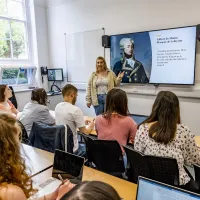
English and History

English and History with Year Abroad
-
Study
- View all courses
- Taught postgraduate study
- Pre-sessional English courses
-
Subjects
- Acoustical engineering
- Aeronautical and astronautical engineering
- Ageing and gerontology
- Archaeology
- Art, design and fashion
- Audiology
- Biological sciences
- Biomedical and medical engineering
- Business, accounting, finance and marketing
- Chemistry
- Civil engineering
- Computer science and software engineering
- Economics
- Education
- Electrical and electronic engineering
- English
- Film studies
- French
- Geography and environmental science
- History
- Languages and linguistics
- Law
- Maritime engineering
- Mathematical sciences
- Mechanical engineering
- Medicine
- Music
- Nursing, midwifery and healthcare
- Ocean and Earth science
- Philosophy
- Photonics and optoelectronics
- Physics and astronomy
- Politics and international relations
- Psychology
- Social statistics and demography
- Sociology, social policy and criminology
-
PhDs and research degrees
- Create your own research project
-
Find a PhD project
- A missing link between continental shelves and the deep sea: Have we underestimated the importance of land-detached canyons?
- A study of rolling contact fatigue in electric vehicles (EVs)
- Acoustic monitoring of forest exploitation to establish community perspectives of sustainable hunting
- Acoustic sensing and characterisation of soil organic matter
- Advancing intersectional geographies of diaspora-led development in times of multiple crises
- Aero engine fan wake turbulence – Simulation and wind tunnel experiments
- Against Climate Change (DACC): improving the estimates of forest fire smoke emissions
- All-in-one Mars in-situ resource utilisation (ISRU) system and life-supporting using non-thermal plasma
- An electromagnetic study of the continent-ocean transition southwest of the UK
- An investigation of the relationship between health, home and law in the context of poor and precarious housing, and complex and advanced illness
- Antibiotic resistance genes in chalk streams
- Being autistic in care: Understanding differences in care experiences including breakdowns in placements for autistic and non-autistic children
- Biogeochemical cycling in the critical coastal zone: Developing novel methods to make reliable measurements of geochemical fluxes in permeable sediments
- Bloom and bust: seasonal cycles of phytoplankton and carbon flux
- British Black Lives Matter: The emergence of a modern civil rights movement
- Building physics for low carbon comfort using artificial intelligence
- Business studies and management: accounting
- Business studies and management: banking and finance
- Business studies and management: decision analytics and risk
- Business studies and management: digital and data driven marketing
- Business studies and management: human resources (HR) management and organisational behaviour
- Business studies and management: strategy, innovation and entrepreneurship
- Carbon storage in reactive rock systems: determining the coupling of geo-chemo-mechanical processes in reactive transport
- Cascading hazards from the largest volcanic eruption in over a century: What happened when Hunga Tonga-Hunga Ha’apai erupted in January 2022?
- Characterisation of cast austenitic stainless steels using ultrasonic backscatter and artificial intelligence
- Climate Change effects on the developmental physiology of the small-spotted catshark
- Climate at the time of the Human settlement of the Eastern Pacific
- Collaborative privacy in data marketplaces
- Compatibility of climate and biodiversity targets under future land use change
- Cost of living in modern and fossil animals
- Creative clusters in rural, coastal and post-industrial towns
- Deep oceanic convection: the outsized role of small-scale processes
- Defect categories and their realisation in supersymmetric gauge theory
- Defining the Marine Fisheries-Energy-Environment Nexus: Learning from shocks to enhance natural resource resilience
- Design and fabrication of next generation optical fibres
- Developing a practical application of unmanned aerial vehicle technologies for conservation research and monitoring of endangered wildlife
- Development and evolution of animal biomineral skeletons
- Development of all-in-one in-situ resource utilisation system for crewed Mars exploration missions
- Ecological role of offshore artificial structures
- Effect of embankment and subgrade weathering on railway track performance
- Efficient ‘whole-life’ anchoring systems for offshore floating renewables
- Electrochemical sensing of the sea surface microlayer
- Engagement with nature among children from minority ethnic backgrounds
- Enhancing UAV manoeuvres and control using distributed sensor arrays
- Ensuring the Safety and Security of Autonomous Cyber-Physical Systems
- Environmental and genetic determinants of Brassica crop damage by the agricultural pest Diamondback moth
- Estimating marine mammal abundance and distribution from passive acoustic and biotelemetry data
- Evolution of symbiosis in a warmer world
- Examining evolutionary loss of calcification in coccolithophores
- Explainable AI (XAI) for health
- Explaining process, pattern and dynamics of marine predator hotspots in the Southern Ocean
- Exploring dynamics of natural capital in coastal barrier systems
- Exploring the mechanisms of microplastics incorporation and their influence on the functioning of coral holobionts
- Exploring the potential electrical activity of gut for healthcare and wellbeing
- Exploring the trans-local nature of cultural scene
- Facilitating forest restoration sustainability of tropical swidden agriculture
- Faulting, fluids and geohazards within subduction zone forearcs
- Faulting, magmatism and fluid flow during volcanic rifting in East Africa
- Fingerprinting environmental releases from nuclear facilities
- Flexible hybrid thermoelectric materials for wearable energy harvesting
- Floating hydrokinetic power converter
- Glacial sedimentology associated subglacial hydrology
- Green and sustainable Internet of Things
- How do antimicrobial peptides alter T cell cytokine production?
- How do calcifying marine organisms grow? Determining the role of non-classical precipitation processes in biogenic marine calcite formation
- How do neutrophils alter T cell metabolism?
- How well can we predict future changes in biodiversity using machine learning?
- Hydrant dynamics for acoustic leak detection in water pipes
- If ‘Black Lives Matter’, do ‘Asian Lives Matter’ too? Impact trajectories of organisation activism on wellbeing of ethnic minority communities
- Illuminating luciferin bioluminescence in dinoflagellates
- Imaging quantum materials with an XFEL
- Impact of neuromodulating drugs on gut microbiome homeostasis
- Impact of pharmaceuticals in the marine environment in a changing world
- Improving subsea navigation using environment observations for long term autonomy
- Information theoretic methods for sensor management
- Installation effect on the noise of small high speed fans
- Integrated earth observation mapping change land sea
- Interconnections of past greenhouse climates
- Investigating IgG cell depletion mechanisms
- Is ocean mixing upside down? How mixing processes drive upwelling in a deep-ocean basin
- Landing gear aerodynamics and aeroacoustics
- Lightweight gas storage: real-world strategies for the hydrogen economy
- Machine learning for multi-robot perception
- Machine learning for multi-robot perception
- Marine ecosystem responses to past climate change and its oceanographic impacts
- Mechanical effects in the surf zone - in situ electrochemical sensing
- Microfluidic cell isolation systems for sepsis
- Migrant entrepreneurship, gender and generation: context and family dynamics in small town Britain
- Miniaturisation in fishes: evolutionary and ecological perspectives
- Modelling high-power fibre laser and amplifier stability
- Modelling soil dewatering and recharge for cost-effective and climate resilient infrastructure
- Modelling the evolution of adaptive responses to climate change across spatial landscapes
- Nanomaterials sensors for biomedicine and/or the environment
- New high-resolution observations of ocean surface current and winds from innovative airborne and satellite measurements
- New perspectives on ocean photosynthesis
- Novel methods of detecting carbon cycling pathways in lakes and their impact on ecosystem change
- Novel technologies for cyber-physical security
- Novel transparent conducting films with unusual optoelectronic properties
- Novel wavelength fibre lasers for industrial applications
- Ocean circulation and the Southern Ocean carbon sink
- Ocean influence on recent climate extremes
- Ocean methane sensing using novel surface plasmon resonance technology
- Ocean physics and ecology: can robots disentangle the mix?
- Ocean-based Carbon Dioxide Removal: Assessing the utility of coastal enhanced weathering
- Offshore renewable energy (ORE) foundations on rock seabeds: advancing design through analogue testing and modelling
- Optical fibre sensing for acoustic leak detection in buried pipelines
- Optimal energy transfer in nonlinear systems
- Optimal energy transfer in nonlinear systems
- Optimizing machine learning for embedded systems
- Oxidation of fossil organic matter as a source of atmospheric CO2
- Partnership dissolution and re-formation in later life among individuals from minority ethnic communities in the UK
- Personalized multimodal human-robot interactions
- Preventing disease by enhancing the cleaning power of domestic water taps using sound
- Quantifying riparian vegetation dynamics and flow interactions for Nature Based Solutions using novel environmental sensing techniques
- Quantifying the response and sensitivity of tropical forest carbon sinks to various drivers
- Quantifying variability in phytoplankton electron requirements for carbon fixation
- Resilient and sustainable steel-framed building structures
- Resolving Antarctic meltwater events in Southern Ocean marine sediments and exploring their significance using climate models
- Robust acoustic leak detection in water pipes using contact sound guides
- Silicon synapses for artificial intelligence hardware
- Smart photon delivery via reconfigurable optical fibres
- The Gulf Stream control of the North Atlantic carbon sink
- The Mayflower Studentship: a prestigious fully funded PhD studentship in bioscience
- The calming effect of group living in social fishes
- The duration of ridge flank hydrothermal exchange and its role in global biogeochemical cycles
- The evolution of symmetry in echinoderms
- The impact of early life stress on neuronal enhancer function
- The oceanic fingerprints on changing monsoons over South and Southeast Asia
- The role of iron in nitrogen fixation and photosynthesis in changing polar oceans
- The role of singlet oxygen signaling in plant responses to heat and drought stress
- Time variability on turbulent mixing of heat around melting ice in the West Antarctic
- Triggers and Feedbacks of Climate Tipping Points
- Uncovering the drivers of non-alcoholic fatty liver disease progression using patient derived organoids
- Understanding recent land-use change in Snowdonia to plan a sustainable future for uplands: integrating palaeoecology and conservation practice
- Understanding the role of cell motility in resource acquisition by marine phytoplankton
- Understanding the structure and engagement of personal networks that support older people with complex care needs in marginalised communities and their ability to adapt to increasingly ‘digitalised’ health and social care
- Unpicking the Anthropocene in the Hawaiian Archipelago
- Unraveling oceanic multi-element cycles using single cell ionomics
- Unravelling southwest Indian Ocean biological productivity and physics: a machine learning approach
- Using acoustics to monitor how small cracks develop into bursts in pipelines
- Using machine learning to improve predictions of ocean carbon storage by marine life
- Vulnerability of low-lying coastal transportation networks to natural hazards
- X-ray imaging and property characterisation of porous materials
- Funding your research degree
- How to apply for a PhD or research degree
- How to make a PhD enquiry
- Support while studying your PhD or research degree
- Exchanges and studying abroad
- Undergraduate study
-
Tuition fees, funding and scholarships
- Fee status
- Scholarships
- Undergraduate funding options
-
Postgraduate funding options
-
Postgraduate scholarships
- Black Futures Postgraduate Research Scholarships (Environmental and Life Sciences)
- Black Futures scholarship
- China Excellence Scholarship
- GREAT Scholarships 2025 – Egypt
- GREAT Scholarships 2025 – France
- GREAT Scholarships 2025 – Ghana
- Horizon Europe fee waiver
- India Excellence Scholarship
- Nigeria Excellence Scholarship
- Nursing Global Impact Scholarship
- Postgraduate Taught Diversity Scholarship (Environmental and Life Sciences)
- Social Impact Scholarships
- Southampton Business School (MSc) Dean Scholarship (UK)
- Southampton Faculty of Medicine PGT Talent Scholarship
- Southampton History Patricia Mather and Helen Patterson Scholarship
- Southampton MA Holocaust scholarships
- Southampton Philosophy David Humphris-Norman Scholarship
- Southampton Philosophy MA Scholarship
- Southampton Photonics Impact Scholarship
- Southampton UK Alumni Music Scholarship
- Study in Art and Media Technology Scholarship
- Thailand Excellence Scholarship
- The National Institute for Health and care Research South Central INSIGHT Programme
- The South Coast Doctoral Training Partnership Social Science PhD Studentships
- Vietnam Excellence Scholarship
- Spärck AI Scholarship
-
Postgraduate scholarships
-
International funding options
-
Scholarships for international students
- Engineering Global Talent Scholarship
- Higher Education Scholarships for Palestinians - HESPAL
- Medical Technology, Innovation and Design Master’s Scholarship
- Merit scholarships for international undergraduates
- Presidential bursaries
- Winchester School of Art Postgraduate Global Talent Scholarship
- Becas Chile Scholarship
- Chevening Scholarships
- China Scholarship Council Scholarships
- COLFUTURO Scholarships
- Commonwealth Distance Learning Scholarships
- Commonwealth Master's Scholarships
- Commonwealth PhD Scholarships
- Commonwealth PhD Scholarships for high income countries
- Commonwealth Shared Scholarships
- Excellence Scholarship
- FIDERH Scholarships
- Southampton Education Civic Scholarship
- Fulbright Awards
- Southampton Ageing and Gerontology Talent Scholarship
- Southampton Teachers' Postgraduate Scholarship
- FUNED Scholarships
- Great Scholarships 2024 – Mexico
- Great Scholarships 2024 – Nigeria
- Marshall Scholarship
- Saïd Foundation Scholarships
- Southampton Canadian Prestige Scholarship for Law
- Xiamen University PhD Scholarships
- GREAT scholarships 2026 – Indonesia
-
Scholarships for international students
- External funding opportunities
- Short courses
- Lunchtime evening and weekend courses
- Clearing
- Summer schools
- Get a prospectus
- Student life
-
Research
- Our impact
- Research projects
- Research areas
- Research facilities
- Collaborate with us
-
Institutes, centres and groups
- Active Living
- Advanced Fibre Applications
- Advanced Laser Laboratory
- Advanced Project Management Research Centre
- Antibody and Vaccine Group
- Astronomy Group
- Autism Community Research Network @ Southampton (ACoRNS)
- Bioarchaeology and Osteoarchaeology at Southampton (BOS)
- Bladder and Bowel Management
- Cell and Developmental Biology
- Centre for Defence and Security Research
- Centre for Developmental Origins of Health and Disease
- Centre for Digital Finance
- Centre for Eastern European and Eurasian Studies (CEEES)
- Centre for Empirical Research in Finance and Banking (CERFIB)
- Centre for Geometry, Topology, and Applications
- Centre for Global Health and Policy (GHaP)
- Centre for Green Maritime Innovation (cGMI)
- Centre for Health Technologies
- Centre for Healthcare Analytics
- Centre for Human Development, Stem Cells and Regeneration
- Centre for Imperial and Postcolonial Studies
- Centre for Inclusive and Sustainable Entrepreneurship and Innovation (CISEI)
- Centre for International Film Research (CIFR)
- Centre for International Law and Globalisation
- Centre for Internet of Things and Pervasive Systems
- Centre for Justice Studies
- Centre for Linguistics, Language Education and Acquisition Research
- Centre for Machine Intelligence
- Centre for Maritime Archaeology
- Centre for Medieval and Renaissance Culture (CMRC)
- Centre for Political Ethnography (CPE)
- Centre for Research in Accounting, Accountability and Governance
- Centre for Research on Work and Organisations
- Centre for Resilient Socio-Technical Systems
- Centre for Transnational Studies
- Child and Adolescent Research Group
- Clinical Ethics, Law and Society (CELS)
- Clinical Legal Education
- Computational Nonlinear Optics
- Cyber Security Academy
- Data Science Group
- Digital Oceans
- EPSRC and MOD Centre for Doctoral Training in Complex Integrated Systems for Defence and Security
- Economic Theory and Experimental Economics
- Economy, Society and Governance
- Electrical Power Engineering
- Environmental Hydraulics
- Gas Photonics in Hollow Core Fibres
- Geochemistry
- Global Health (Demography)
- Global Health Community of Practice
- Gravity group
- High Power Fibre Lasers
- Hollow Core Fibre
- Human Genetics and Genomic Medicine
- Infection
- Infrastructure Group
- Institute of Developmental Sciences
- Institute of Maritime Law (IML)
- Integrated Photonic Devices
- Interdisciplinary Musculoskeletal Health
- International Centre for Ecohydraulics Research (ICER)
- Language Assessment and Testing Unit (LATU)
- Laser-Direct-Write (LDW) Technologies for Biomedical Applications
- Law and Technology Centre
- Long Term Conditions
- Magnetic Resonance
- Mathematical Modelling
- Medicines Management
- Molecular and Precision Biosciences
- Multiwavelength Accretion and Astronomical Transients
- National Biofilms Innovation Centre (NBIC)
- National Centre for Research Methods
- National Infrastructure Laboratory
- Nature-Based Ocean Solutions
- Nonlinear Semiconductor Photonics
- Ocean Perception Group
- Operational Research
- Optical Engineering and Quantum Photonics Group
- Paediatrics and Child Health - Clinical and Experimental Sciences
- People, Property, Community
- Photonic Systems, Circuits and Sensors Group
- Physical Optics
- Primary Care Research Centre
- Quantum, Light and Matter Group
- Silica Fibre Fabrication
- Silicon Photonics
- Skin Sensing Research Group
- Southampton Ethics Centre
- Southampton Health Technology Assessments Centre (SHTAC)
- Southampton High Energy Physics group
- Southampton Imaging
- Southampton Theory Astrophysics and Gravity (STAG) Research Centre
- Stefan Cross Centre for Women, Equality and Law
- String theory and holography
- The India Centre for Inclusive Growth and Sustainable Development
- The Parkes Institute
- Tony Davies High Voltage Laboratory
- Ultrafast X-ray Group
- Vision Science
- WSA Exchange
- Work Futures Research Centre (WFRC)
- Support for researchers
- Faculties, schools and departments
- Interdisciplinary research
- Find people and expertise
- Research jobs
- Business
- Global
- About
- Visit
- Alumni
- Departments
- News
- Events
- Contact
